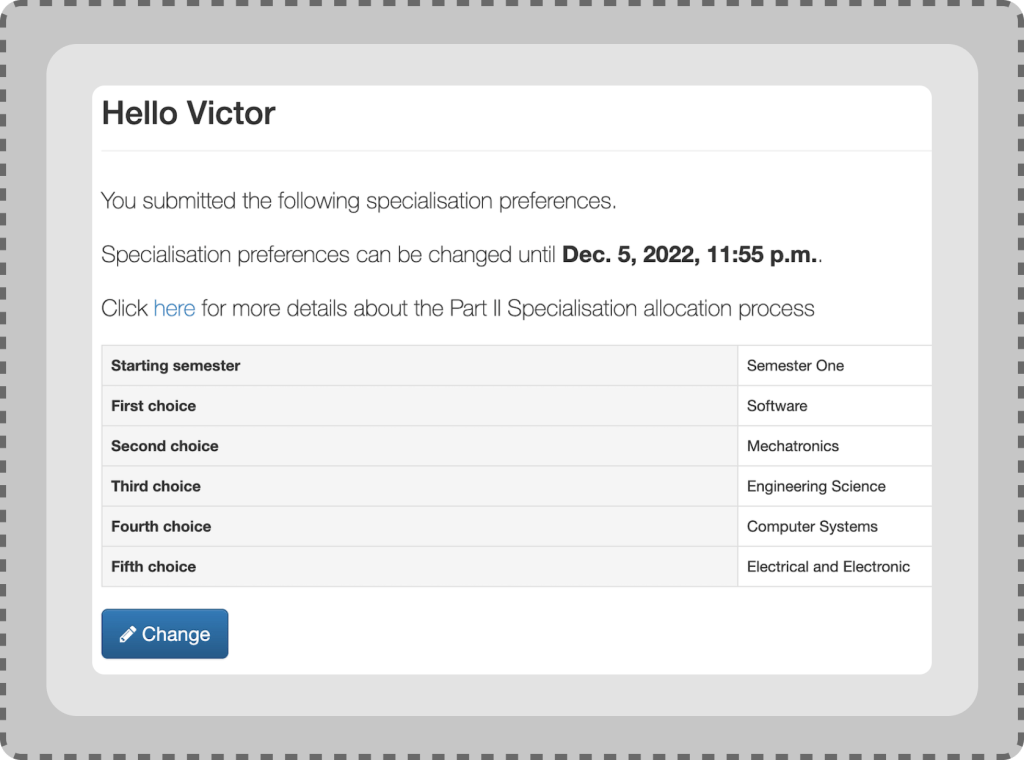Contents
Preamble
I was having trouble coming up with a title, but then I remembered last year, reading a couple of Cecilia Wang’s blog posts from the Inside World. I recall really enjoying them, and I would highly recommend checking them out if you haven’t! As a way to pay homage, I thought I’d use her final title, “Beginnings and Endings” (in other words, I just stole it, sorry!). But y’know what, it’s quite fitting!
Choosing a Specialisation
With semester two coming to a close, now’s a good time to touch on how you choose your specialisation. If you haven’t already, you’ll soon be given access to a form where you can submit your top 5 choices.
- 90 points worth of courses including ENGSCI 111,
- ENGGEN 199 (DELNA), and,
- ACADINT 101 (Academic Integrity Course).
As far as Software is concerned, you will have to have passed ENGGEN 131 as well. There will be 2 rounds of offers to accommodate Summer School students and BIOMED transfers. Anecdotally, the GPA requirement in the second round falls by approximately 0.3. Last year’s GPA cutoffs are often a good indicator of what to aim for, but that isn’t to say the actual requirement may be higher or lower.
The portal which you will use to select your desired specialisation looks like the following:

Goodbye
A year has almost gone by, and it feels so surreal. I’ve managed to meet so many incredible people, both within and outside of the already incredible Software cohort. Sure, the workload in Part II is more challenging than Part I, but those late-night discussions on assignments and countless chats with friends are moments I’ll cherish forever (despite being quite stress-inducing at the time 💀). While Software as a specialisation isn’t flawless, I’ve come to be quite happy with what I have gotten out of it this year.
To conclude this final blog post, here are some tips I’d like to offer when making the transition from Part I to II:
- Summer School: Consider doing SOFTENG 299 in summer school. If you are a conjoint student, also consider doing ENGSCI 211 in summer school. Semester one is dense with content. Furthermore, it’s a bit of a leap from the well-structured Part I, where Part II feels like it’s handled with a fair bit less care. Getting a headstart will probably save you some headaches in the busier weeks.
- Lecture Attendance: Although I stand by the fact that lectures are an efficient way to teach, there is still value in showing up. It’s quite surprising how easy it is to fall behind, especially when recordings are not posted immediately.
- Expand your Circle: Meet new people! I knew very few people going into Software; however, having a support system throughout the year is something I have grown to be so grateful for! Tutorial attendance can help with this (most of my friends now I met through sharing the same struggles I did in tutorials!).
- Dive into Extracurriculars: One of my biggest regrets in Part I was not getting involved in clubs, and as such, perhaps overcompensated in Part II. Nonetheless, I stand by the fact that you should participate in a competition or two, and get involved in an exec team – it can be loads of fun amidst all the uni work.
- Value Beyond Grades: Remember your self-worth isn’t tied to your academic grades. Pursue excellence, not letters.
- Overcoming Doubts: My journey into Software wasn’t without its doubts. Initial weeks brought apprehension, but by year’s end, I managed to settle in quite well. I guess what I’m trying to say is that it’s okay to have reservations, as often, they pave the way for greater clarity.
If you’ve got more questions or just want to chat, don’t hesitate to reach out. Whether it’s a direct message or a casual chat, when you bump into me, I’m always happy to help!
To conclude, I want to say, Part II Software has been an incredible journey! Like any specialisation, it had its highs and lows, but I can confidently say that I’ve emerged as a better engineer because of it. Each challenge I encountered came with its own rewards, and for that, I’m immensely thankful!
That’s all from me, until we meet again!
– Victor
